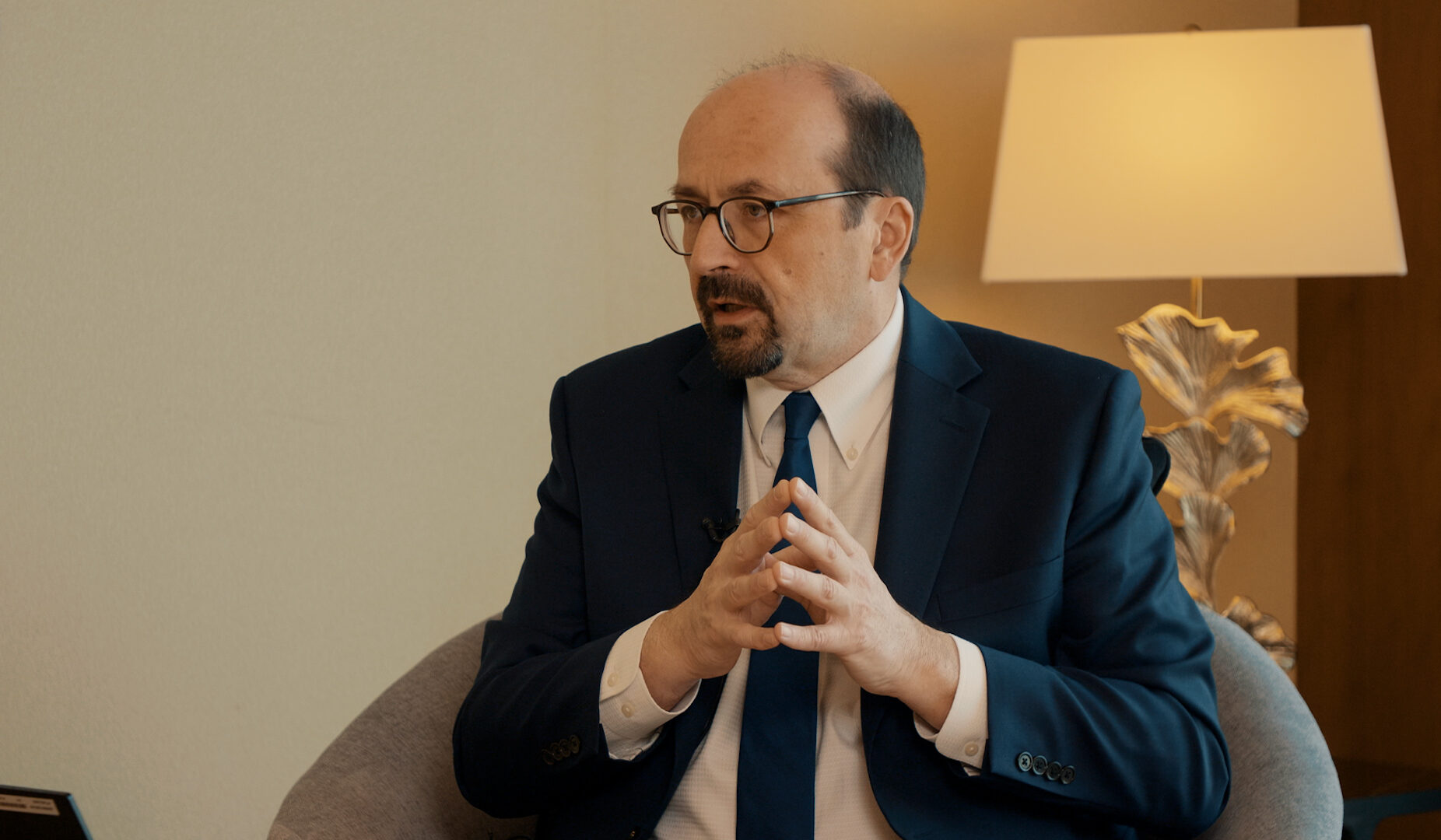ASTANA — The Astana Times had the privilege of sitting down with the IMF Mission Chief for Kazakhstan, Nicolas Blancher, to discuss the outcome of the 2023 Article IV consultation with Kazakhstan, which concluded this November. Blancher provided insights into the country’s economic prospects, key risks, and policy issues. The interview delved in particular into the IMF’s view on Kazakhstan’s decision to increase the value-added tax (VAT) and on the risks of secondary sanctions.

IMF Mission Chief for Kazakhstan, Nicolas Blancher. Photo credit: The Astana Times.
For the complete conversation, stay tuned for the release of the full video interview on The Astana Times’ YouTube channel in December.
Economic Overview and Growth Prospects
Blancher began by providing an overview of Kazakhstan’s economic developments and prospects, considering both internal and global factors.

IMF Mission Chief for Kazakhstan, Nicolas Blancher spoke to The Astana Times correspondent Aida Haidar. Photo credit: The Astana Times.
“What we see is that growth is currently strong: we expect it to be about 4.8% for 2023, which is a relatively high level,” he said.
However, he noted that growth might slow down in 2024 due to lower expected oil production. Over the medium term, the IMF projects growth to remain around three to 3.5%, with fluctuations depending on oil output and global factors.
“The global oil market is obviously subject to potentially large variations in terms of the oil price. So, this could affect Kazakhstan’s export revenues. We also see potential risks in terms of disruption of oil exports, as the channels for oil exports are not very diversified yet. So there is a need to do more of that, and the authorities aim to do that.” he said.
Among other key risks highlighted by Blancher are uncertain global financial conditions, as well as domestic factors related to persistent inflation, for example.
“I would say that the issue of inflation is not behind us yet. It is still above 10%. We project that it will be around 10.2% at the end of this year, but here also, there are risks. If it is higher, it will be a concern, of course, for the economy in general but also for the population, and social discontent may reemerge, as we have seen in the recent past. That is why it is essential to make sure inflation continues to decline in the weeks and months ahead.” he said
On longer-term risks, Blancher addressed the need for Kazakhstan to also focus on diversifying its economy, including in light of climate change and long-term global decarbonization. He emphasized the importance of structural reforms to address these challenges, stating, “Kazakhstan is in a relatively good position to accelerate reforms because it has good buffers, strong reserves, and fiscal policy space to accompany these reforms and react to shocks.” Key priorities are to improve public sector governance, reduce the state footprint in the economy, and further strengthen the business environment to promote a more vibrant private sector.
Also highlighting upside risks, Blancher mentioned the potential for higher growth if reforms are accelerated or if there is an increase in oil prices. Indeed, he emphasized that Kazakhstan could reach a growth potential closer to the country’s aspirations through decisive and rapid reforms.
VAT Increase and IMF Support
Blancher addressed Kazakhstan’s decision to increase the VAT, stating, “VAT is one of the key taxes to mobilize and elevate the tax revenue-to-GDP ratio, which is relatively low in Kazakhstan.” He supported the move, pointing out that with an increase to 16%, Kazakhstan’s VAT rate would remain within a mid-range compared to other countries, including Organization for Economic Cooperation and Development (OECD) members.
Managing Risks of Secondary Sanctions
When questioned about the risk of secondary sanctions and the IMF’s recommendations, Blancher indicated that geo-political considerations are beyond the focus of the IMF.
“We are not directly concerned by the political dimension, more by the potential economic implications such sanctions may have for Kazakhstan,” he said.
In this context, he commended Kazakhstan’s commitment to preventing any circumvention of international sanctions and the quality of its dialogue with foreign counterparts, which helps limit economic risks in this area.
“As far as we can see, there is ongoing coordination between Kazakhstan’s authorities and the foreign counterparts from the European Union, the United States, and others,” he said.
Blancher highlighted the importance of monitoring trade flows and exercising diligence to ensure regulatory compliance.
“It is a strong signal that they aim to do what it takes to avoid falling under secondary sanctions. This is clear in terms of monitoring trade flows, including on specific sanctioned items. Of course, the sanctions are evolving, and so this is a dynamic process, which explains the importance of close dialogue to adapt to changes,” he said.
He also noted the vigilance of Kazakhstan’s banking system, stating, “banks themselves are cautious in terms of regulatory compliance to avoid the sanctions.”
In conclusion, Blancher expressed confidence in Kazakhstan’s efforts to limit the risks associated with sanctions: “I am confident the authorities will continue to do what it takes to limit the risk.”
